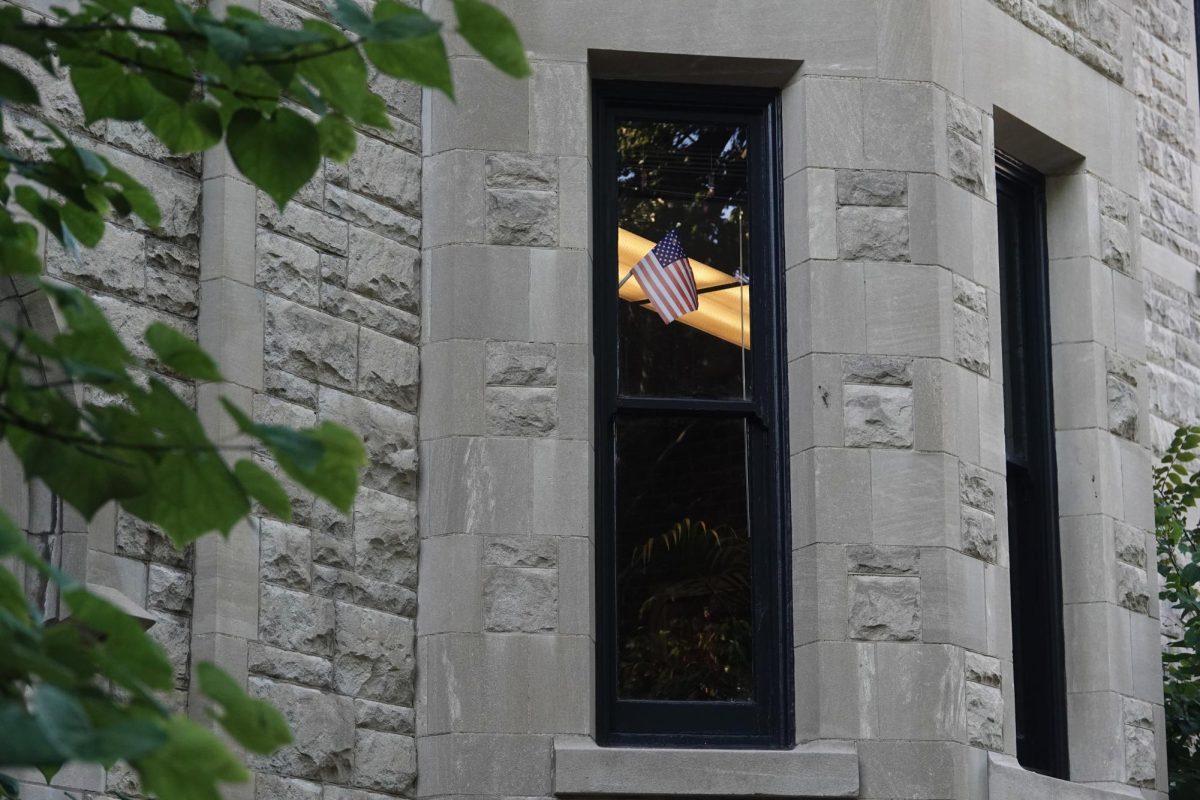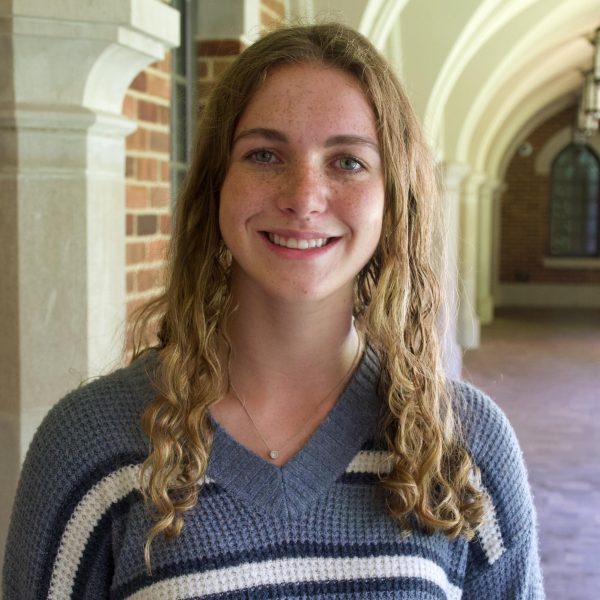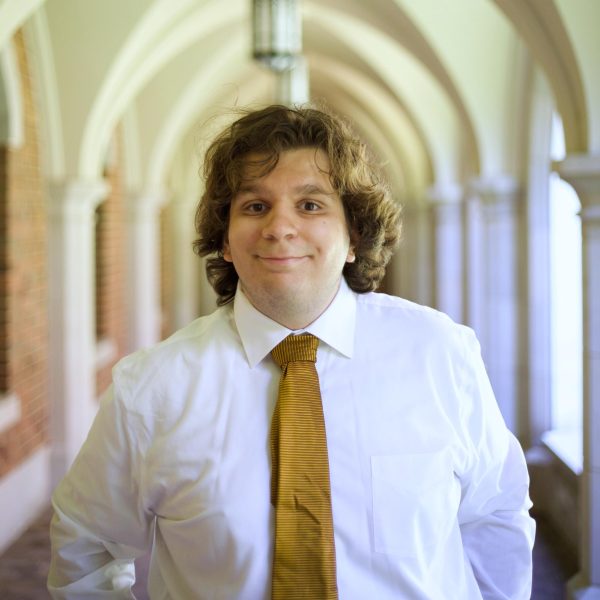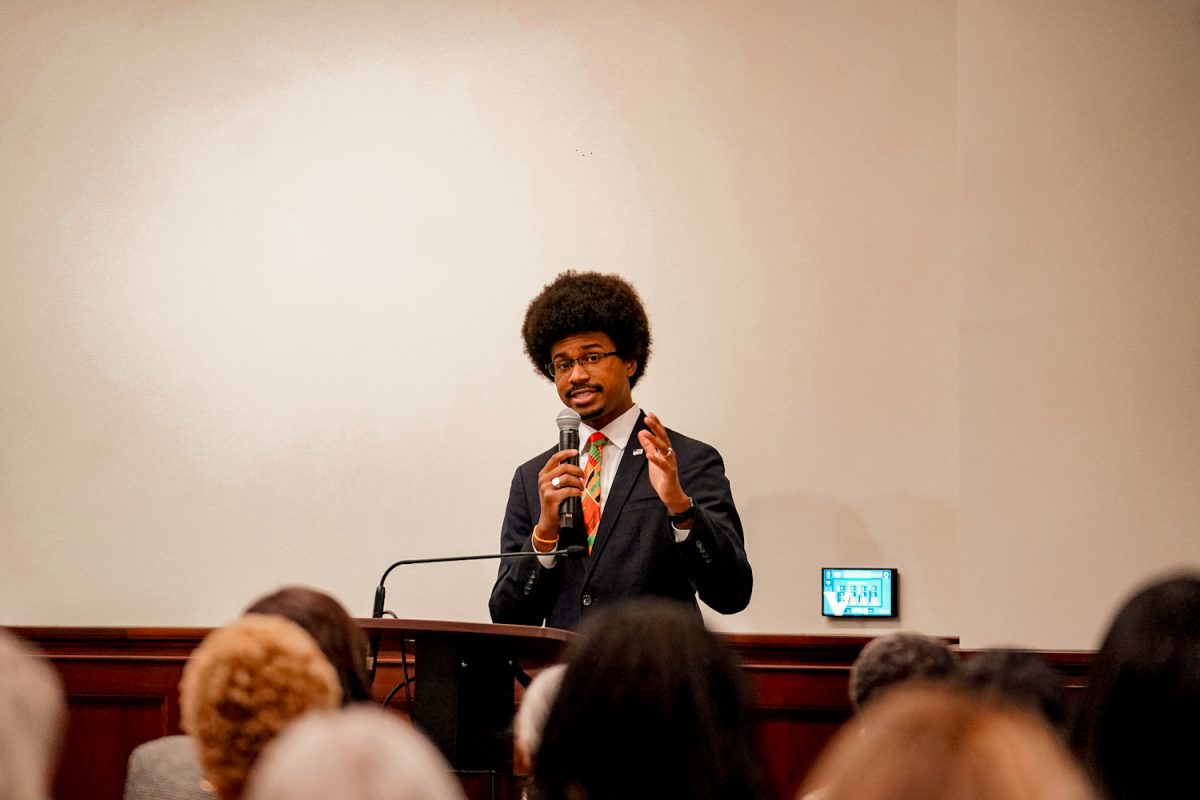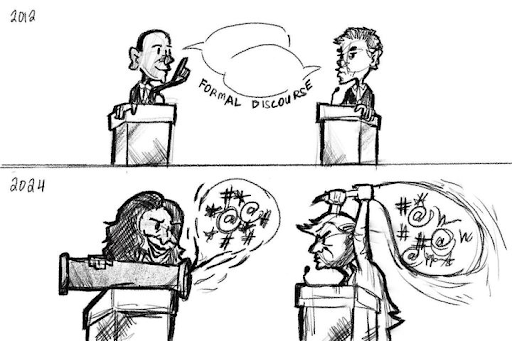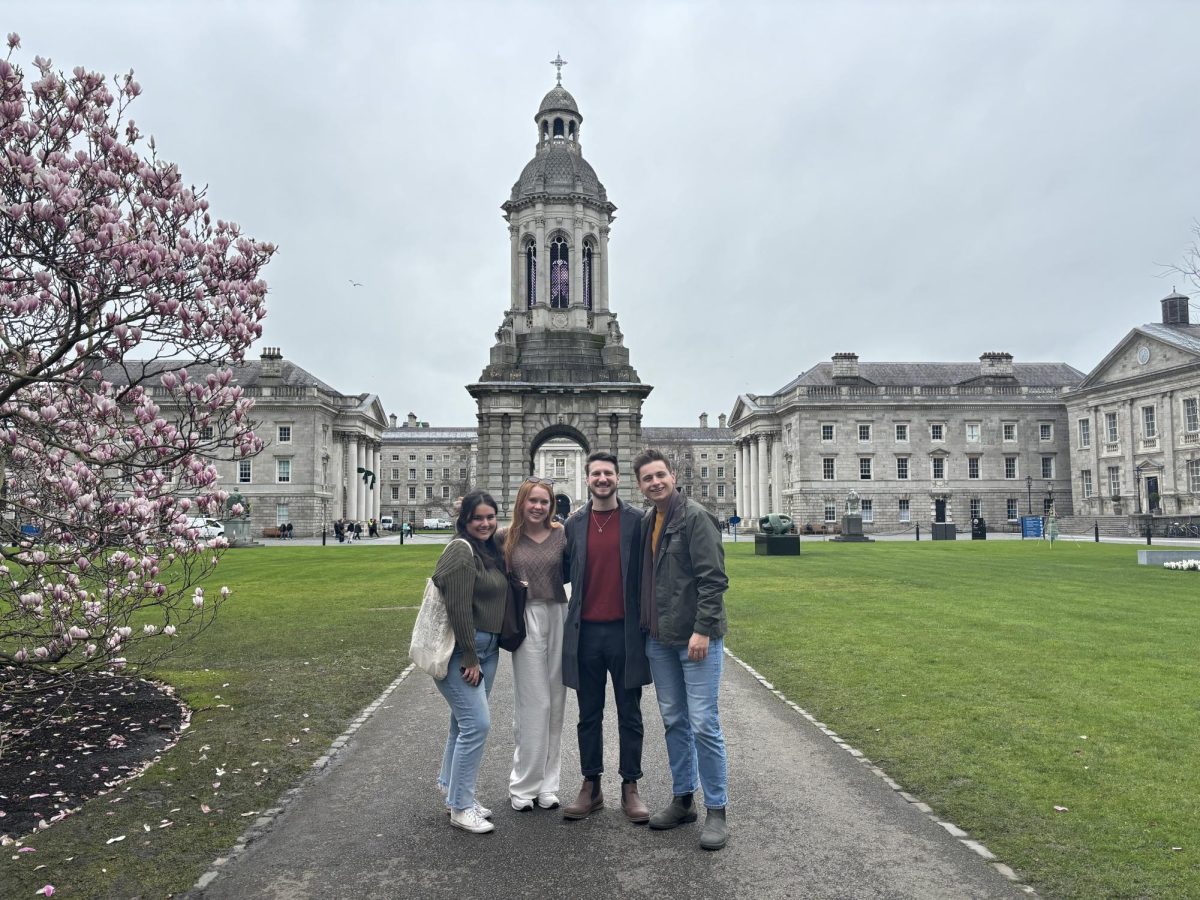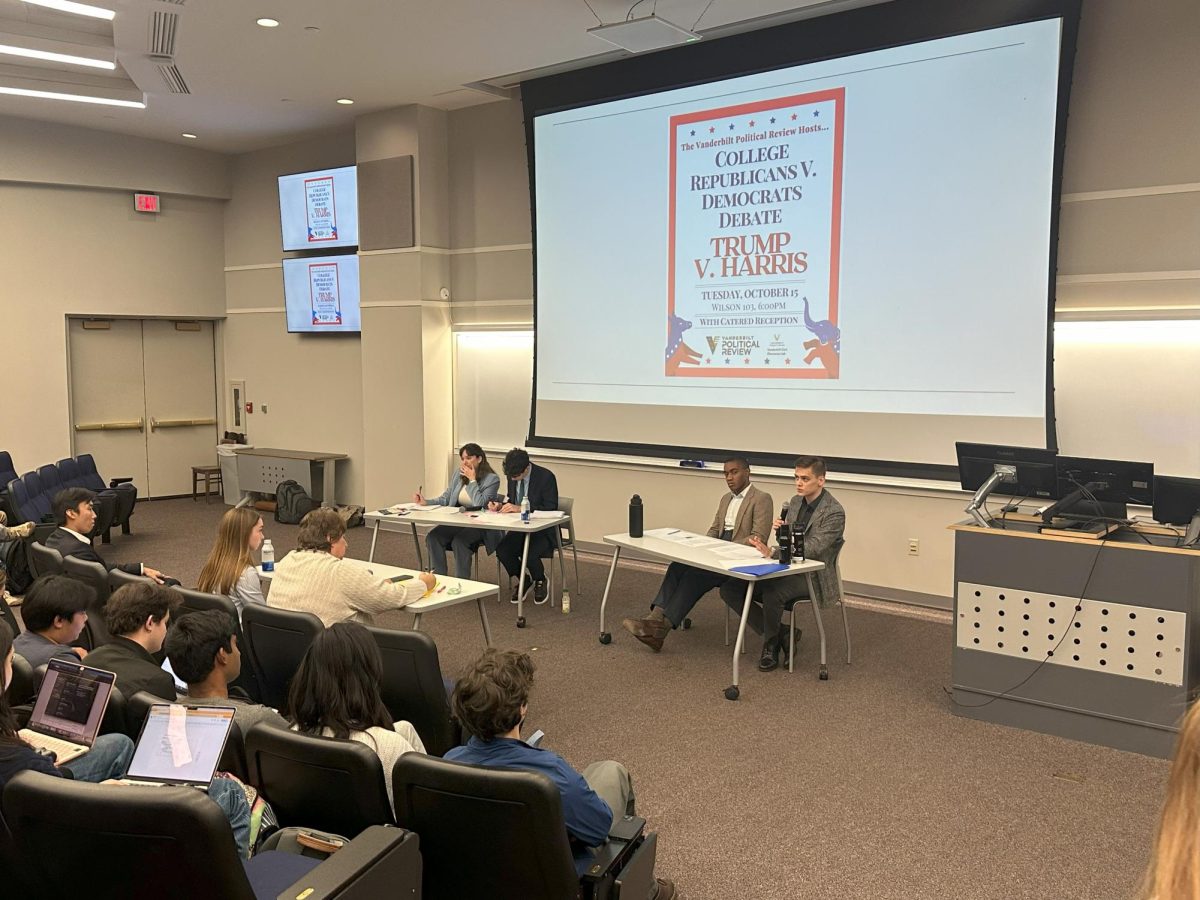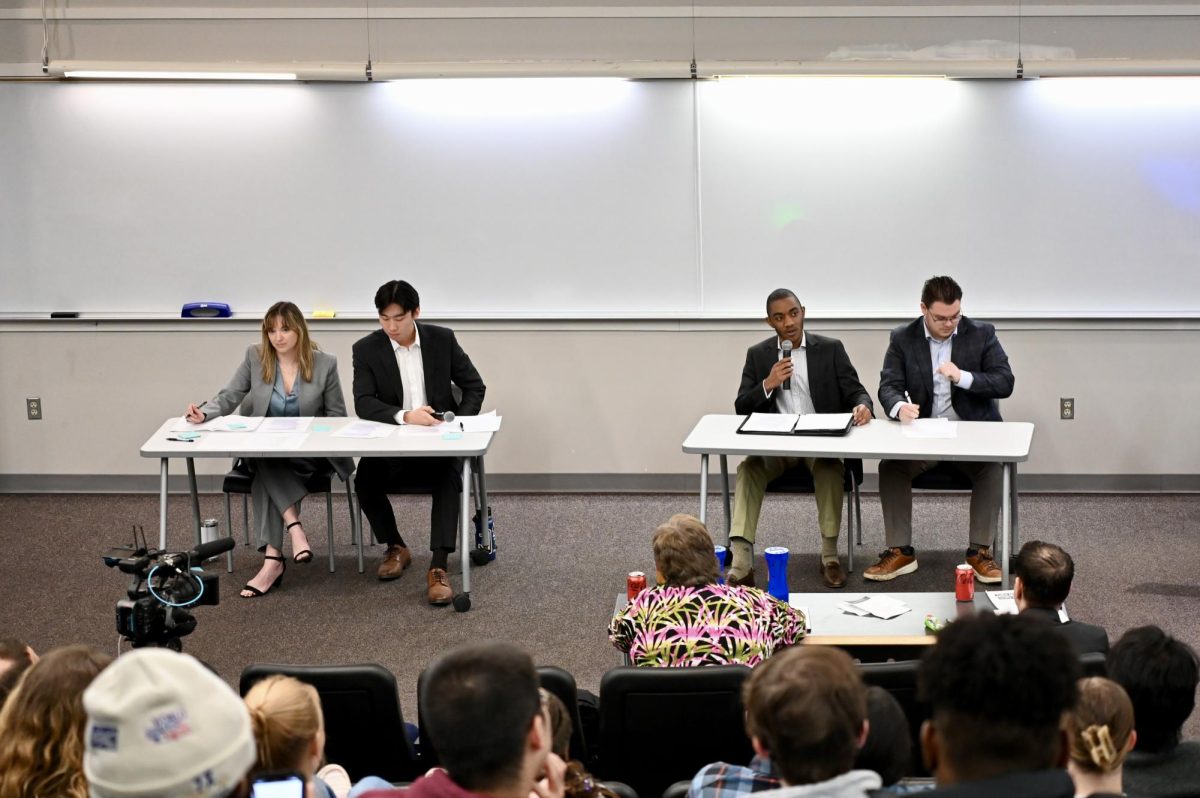Vanderbilt Political Review hosted a policy debate between Vanderbilt College Republicans and Vanderbilt College Democrats on Nov. 4. This debate, moderated by VPR’s deputy editor-in-chief and senior Alex Mormorunni, focused on specific policies at the forefront of campaign efforts.
This debate is the second of its kind in the weeks leading up to the 2024 presidential election between former President Donald Trump and Vice President Kamala Harris. Three weeks ago, VPR hosted a debate on the candidates themselves.
Chancellor Daniel Diermeier opened the debate by welcoming the guests, saying that he is proud of Vanderbilt’s students for having open political discourse on the eve of a polarizing election. Diermeier, a strong proponent of institutional neutrality, said the debate is “a testament to what sets Vanderbilt students apart [from other universities].”
“The Community Creed has as its key component that we’re willing to listen,” Diermeier said. “We never forget that, despite the differences of opinion, background and experience, we are members of one community.”
Abortion
Senior Andrew Kyung, VCD president, responded first on the topic of abortion. Kyung said that Republicans constantly refer to philosophical arguments for defense, but that that law must be looked at for the practical consequences that abortion has on communities.
“The overturning of Roe v. Wade has made it so that women born today are growing up in a world with fewer rights than their mothers and grandmothers once had,” Kyung said. “As a secondary consequence, anti-abortion states have seen the depletion of other women’s health services today.”
Junior Noah Jenkins, president of VCR, said abortion ought to be left to the states.
“People more closely involved in the state governments can choose solutions that better suit them instead of national solutions that would force many people to live under a regime that they do not agree with,” Jenkins said.
The ensuing debate focused on whether abortion is a federal or state issue. Kyung said that because of the natural rights granted to life in the United States through the due process clause of the 14th Amendment, abortion is a federal issue. Jenkins countered that there are many issues that the federal government delegates to the states and that murder is one of these issues, adding that he believes abortion to be murder.
Immigration
Jenkins responded first on immigration saying that the problem with illegal immigration is that it is illegal.
“We are a nation with laws that must be enforced,” Jenkins said.
Kyung focused on the GOP response to illegal immigration in his response on behalf of VCD. He said that mentions of migrant crime in Fox News increased by over 800% between January and February 2024, despite migrant crossings and migrant crimes remaining roughly the same.
“Migrants are people, and some people do bad things. [But] migrant offenders are unrepresentative of asylum seekers,” Kyung said.
During the period of open debate between the VCD and VCR presidents on the topic of immigration, Jenkins and Kyung continued the discussion of crime as it relates to immigration.
Kyung said that he “supports preventing entry” to the United States to those who have previously committed crimes, but that is “unrepresentative” of everyone trying to immigrate to the U.S.
“Even if there was one crime done by an illegal immigrant [in the United States], that is one crime too many because they should not be here in the first place,” Jenkins said.
The debate about immigration concluded with a discussion of Trump’s mass deportation plan. Kyung asked Jenkins if he supported the plan, and Jenkins responded that he would support Trump’s deportation proposal, but he would have to see policy specifics to understand the economic and practical considerations.
Federal bureaucracy
For the final topic of the debate — the federal bureaucracy — Kyung started the discussion. He said that the importance of a federal bureaucracy is overlooked and that checks and balances within the executive branch are just as important as checks and balances across the branches.
“The vast majority of [the 2.8 million civilians employed in the bureaucracy] have civil service protections from being fired on the basis of politics,” Kyung said. “[The protections] are in place to insulate positions that are seen as very important to society from the whims of presidential power.”
Jenkins opened his statements on the bureaucracy with a reference to the Constitution.
“Article two, section one [of the Constitution] says explicitly that the executive power shall be vested in a President of the United States of America,” Jenkins said. “[The article] does not say the President plus his independent executive agencies.”
Jenkins said that Congress can check the executive branch in cases when the President could use power to form a regime.
“If the people see a president run the executive branch in a way they don’t like, [the people] can punish him,” Jenkins said. “They can [choose to] not re-elect him, or if he’s not up for re-election, they can punish his party.”
In the open debate that followed, Jenkins said that making the agencies overly independent effectively creates a fourth branch of government that is not accountable to the people.
“So, advocating for the bureaucracy’s independence is ‘advocating against democracy,’” Jenkins said.
Kyung said that Jenkins’ view of the presidency is a “unitary executive,” and that under this view, there are no positions that straddle the separation of powers.
“We see positions that straddle the line [of separation of power] every day,” Kyung said. “The Vice President is the President of the Senate and often breaks ties; the Attorney General was a judicial officer long before the Department of Justice was created.”
Student reactions
Kyung and Jenkins said their opposition did not make the typical arguments that they were expecting to hear.
“I think people should always enter a really contentious debate with the idea that I could be wrong and maybe the other side has something of value that they can contribute,” Kyung said.
First-year Elliott Cruz said he found the topic of immigration to be the most impactful.
“I come from an immigrant background,” Cruz said. “I hear what [my parents] went through to get to this country and how much they love this country now, and I think it’s a really sensible argument for why we should take a more humanistic approach to immigration.”
Cruz said he wished there was more time for discussion and that it felt like the speakers were cut short as soon as the conversation was getting good. He also said he would like to see the third party, specifically its existence and practicality in the United States, as well as current issues like the Israel-Hamas war discussed in future debates.
Sophomore Samuel Bodwell said he found the debate to be respectful.
“[Respectful is] how debates and conversation should be,” Bodwell said.
Bodwell said that immigration could be revisited in future debates. Other topics Bodwell said he hopes to see in future debates include the economy and foreign policy.
Jenkins said in today’s political atmosphere, maintaining a respectful dialogue can be challenging, especially on the eve of an election.
“Just stay calm. Don’t let your emotions get the best of you, and just make your arguments,” Jenkins said. “If you’re in a conversation and you don’t know something, don’t be afraid [to say so].”

